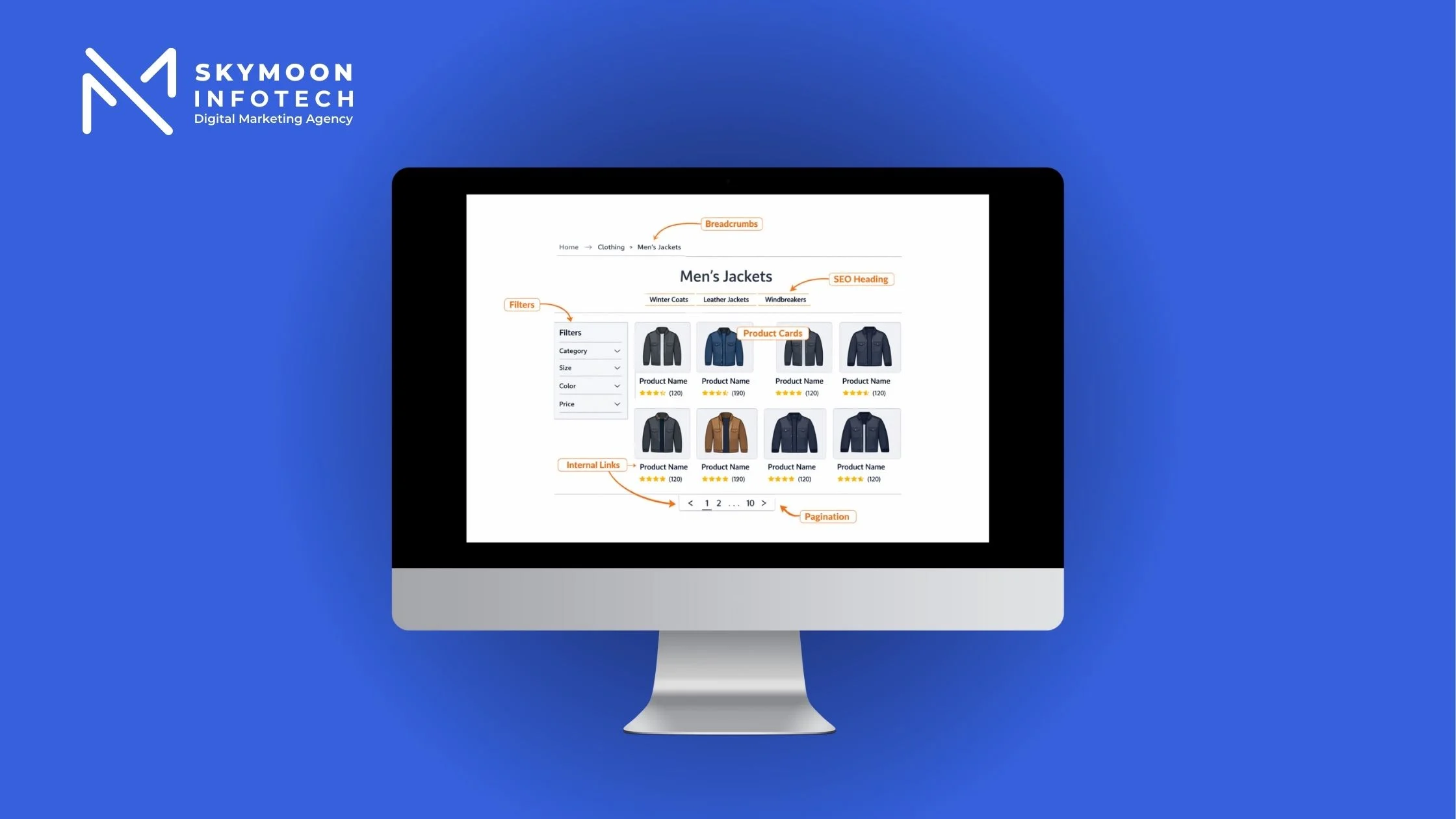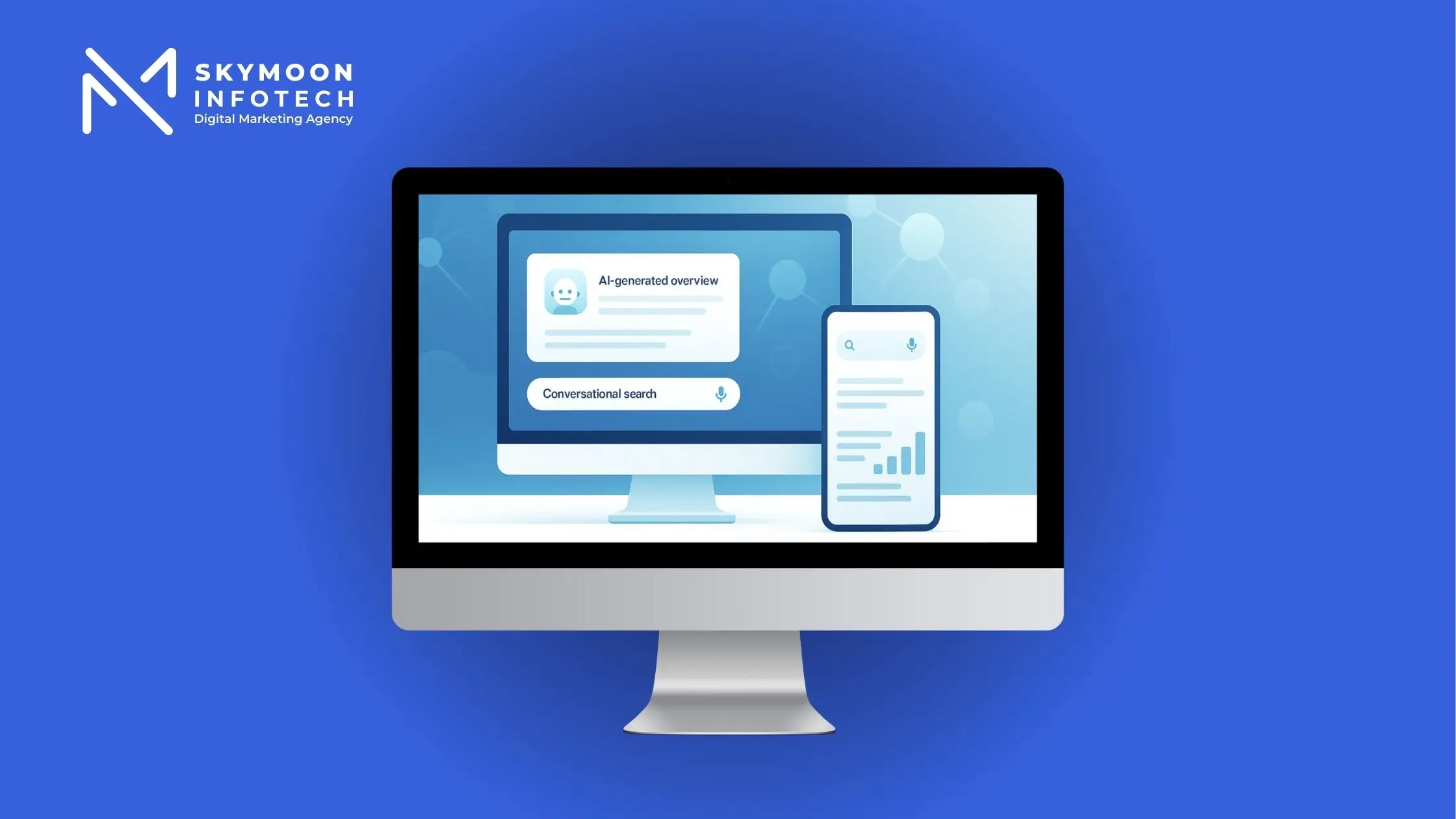AI SEO tools are redefining how e-commerce brands attract traffic, improve rankings, and convert customers in 2025. With search shifting toward AI-driven results, multimodal discovery, and context-aware ranking algorithms, online retailers must move beyond traditional SEO tactics and adopt intelligent, automated optimization systems.
AI now impacts nearly every step of the e-commerce customer journey — from how products appear in search results to how users navigate, engage, and decide. Retailers using AI SEO tools gain faster insights, higher content relevance, better on-page optimization, improved analytics, and more strategic visibility compared to competitors who still rely on manual SEO.
In this blog, we explore 10 powerful, practical, and measurable ways AI is transforming e-commerce SEO, backed by examples, use cases, and industry insights.
Why E-commerce Needs Smarter SEO
E-commerce is entering a new era where traditional SEO signals—keywords, backlinks, and basic on-page optimization—are no longer enough to stay competitive. Search engines now rely heavily on AI-driven ranking systems, user intent modeling, multimodal content evaluation, and contextual understanding. This means e-commerce websites must adopt smarter, AI-powered strategies to maintain visibility.
AI SEO tools help online retailers adapt to these shifts by automating repetitive tasks, improving product-level relevance, enhancing metadata, and understanding user behavior at scale. Instead of optimizing a few pages manually each week, AI allows businesses to optimize hundreds of product pages instantly with consistent quality.
Brands that upgrade to AI-based optimization see improved category rankings, stronger product discovery, and higher conversions—especially in competitive niches. To explore how businesses can strengthen their digital presence with modern optimization techniques, visit our Digital Marketing Services page.
According to Google Search Central, search systems increasingly depend on semantic understanding, context, and user intent—making AI-driven SEO not optional but essential.
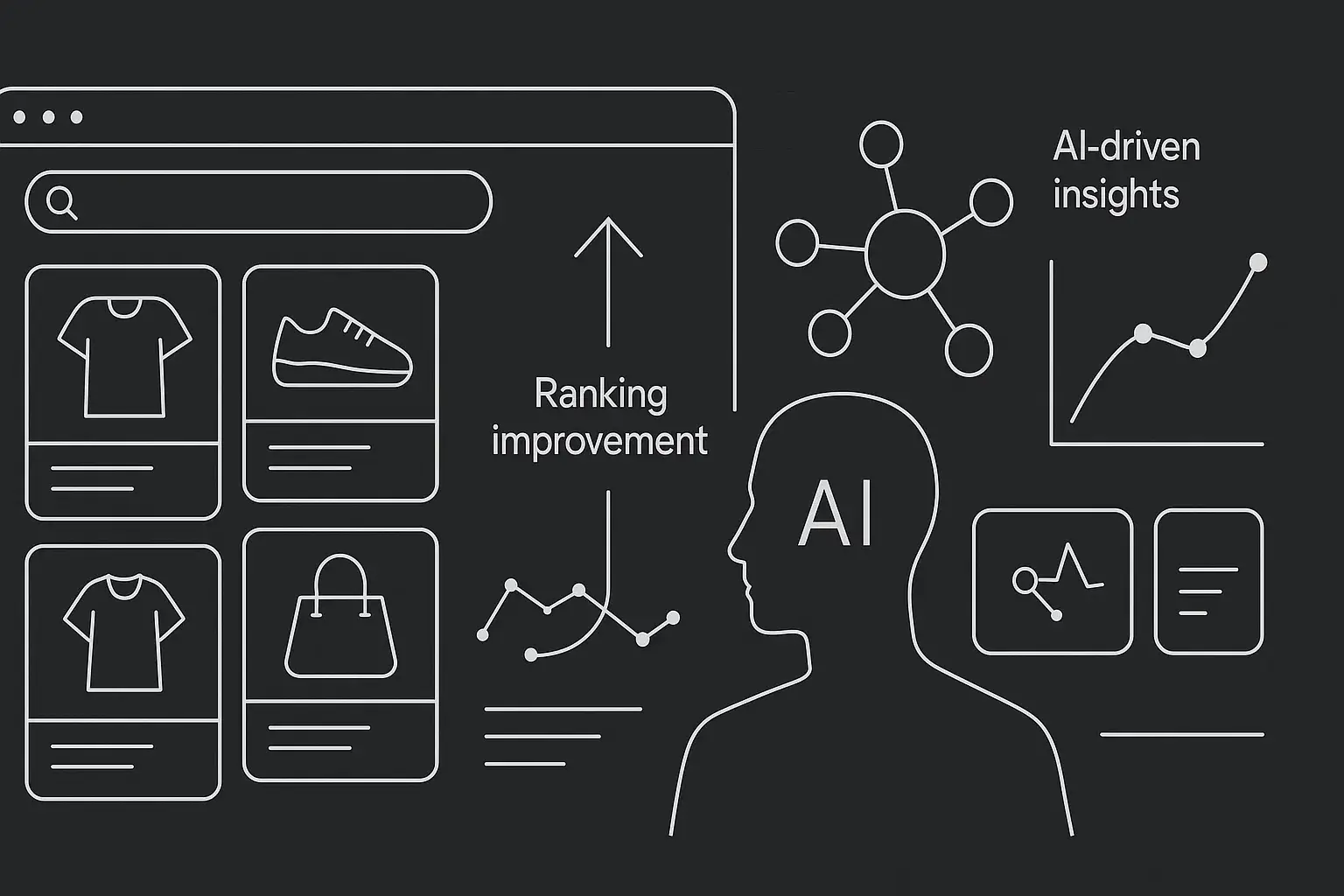
10 Ways AI Is Changing E-commerce
1. Hyper-Personalised Product Discovery Through AI Semantic Analysis
AI has reshaped how shoppers discover products. Instead of relying on simple keyword matches, modern search systems use AI semantic analysis to understand user intent, context, preference patterns, and shopping history. This allows e-commerce platforms to display more accurate and personalized product results—even when customers use vague, long-tail, or conversational queries.
AI on-page SEO tools now adjust product attributes, titles, and metadata dynamically to match semantic queries. This boosts visibility across search engines and improves product discovery inside marketplace search bars as well.
For example, Shopify reports that semantic search and AI-powered recommendations can significantly reduce bounce rates and increase product engagement on large catalogs.
2. AI-Driven Dynamic Pricing and Smarter Inventory Forecasting
Pricing is now a strategic AI function. Modern AI SEO tools integrate with inventory and analytics systems to evaluate demand, competitor pricing, seasonality, and customer behavior. They then recommend optimal price points that improve conversions while protecting margins.
For inventory, AI systems forecast stock needs based on historical trends and live activity. When stock levels fall, AI can automatically adjust product visibility and highlight alternatives—reducing ranking drops caused by out-of-stock issues. This directly boosts SEO performance, as product availability is a critical ranking signal in 2025.
McKinsey estimates that companies using AI for dynamic pricing and forecasting see revenue lifts between 3% to 10% depending on product category.
3. AI-Powered Content Optimization at Scale
E-commerce brands deal with massive amounts of content—from product descriptions to size guides, FAQs, category pages, and blogs. Manually optimizing all of this is nearly impossible, which is why businesses increasingly rely on an AI content optimization tool.
These tools review content quality, improve keyword usage, fix thin or duplicate content, enhance readability, and ensure semantic depth. They also rewrite product descriptions based on user behavior data, making content more persuasive and search-friendly.
Brands that invest in AI-driven content optimization experience stronger rankings for long-tail product searches and faster category visibility growth.
HubSpot highlights that AI-powered content optimization reduces time spent on rewriting by up to 60%.
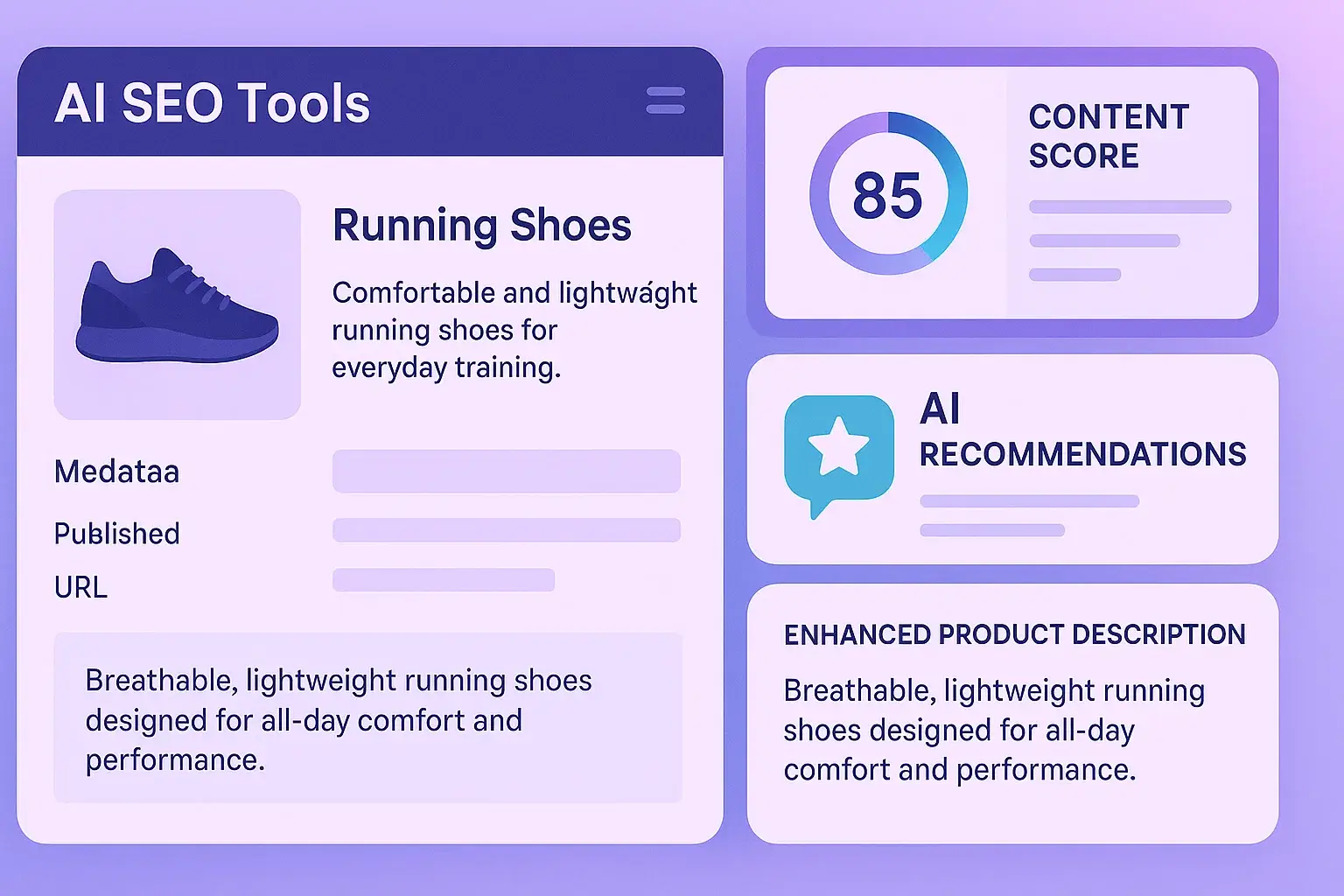
4. Automated Keyword Research for High-Intent Product Searches
Keyword research has evolved far beyond basic volume metrics. In 2025, e-commerce brands rely on an AI keyword research tool to uncover high-intent, purchase-ready keywords at scale. These tools analyze buyer patterns, product attributes, competitor listings, and SERP behavior to recommend keywords that drive conversions—not just traffic.
AI identifies micro-intent phrases such as “best,” “compare,” “under $50,” and “near me,” which traditional tools often overlook. It also maps keywords to products automatically, eliminating hours of manual work.
5. AI Rank Tracking & Predictive SEO Analytics
Traditional rank tracking shows where your pages stand—but AI rank tracking tools go further, predicting future ranking shifts and identifying opportunities before competitors do. A modern AI rank tracker analyzes keyword trends, SERP volatility, competitor moves, and user intent changes to provide actionable insights.
AI SEO analytics tools also highlight which product pages are gaining or losing visibility, which categories need updates, and which content gaps require urgent attention. This enhances decision-making for campaigns, product launches, and seasonal sales planning.
Research from Search Engine Land confirms that AI-based predictive analytics improves SEO planning reliability by up to 40%.
6. AI Link Building Tools for Stronger Authority & Category Rankings
Backlinks remain a major ranking factor, but manual outreach is slow and inconsistent. AI link building tools streamline this process by identifying relevant websites, analyzing authority, evaluating link opportunities, and generating personalized outreach copy.
For e-commerce brands, AI also improves internal linking. It scans your entire product catalog and automatically links related items, categories, and buying guides. This strengthens topical authority and helps Google understand your product structure better.
Authority-building is crucial for competitive e-commerce categories. Moz highlights how AI-powered link intelligence speeds up prospecting across large verticals.
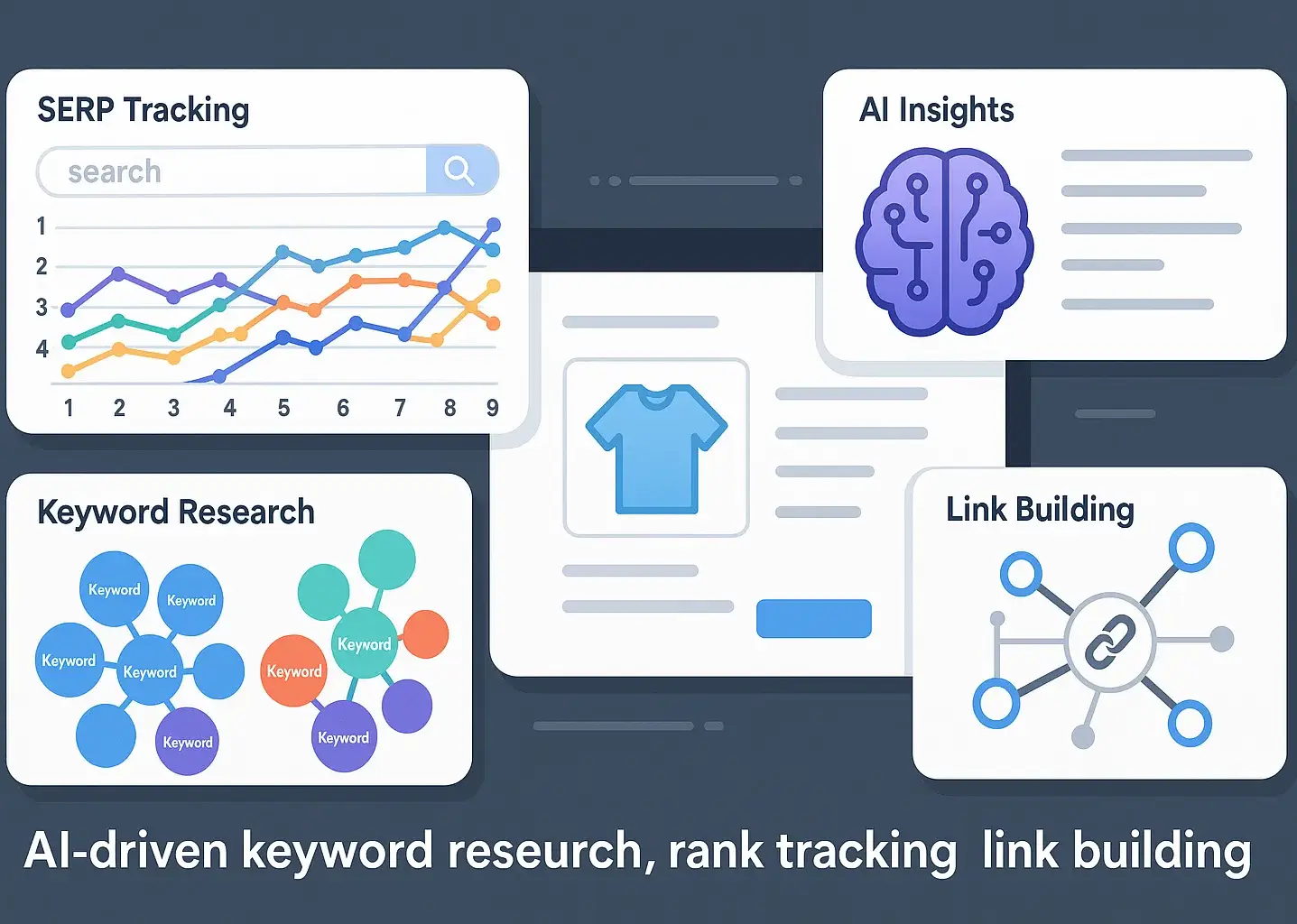
Alt Text:
AI tools performing keyword research, rank tracking, and link-building visualization.
7. Automated Schema Markup & Rich Result Optimization
Structured data is essential for e-commerce SEO—especially in 2025 when AI-first search engines rely more heavily on schema to understand product attributes, reviews, pricing, and availability. AI SEO tools now auto-generate product schema, FAQ schema, review schema, and breadcrumb markup, ensuring every page is fully optimized for rich results.
AI on-page SEO tools evaluate missing fields, validate structured data, and fix errors that typically hurt visibility. This is particularly important for enhancing product display in Google Shopping, AI Overviews, and SERP snippets.
According to Schema.org and Google’s structured data guidelines, pages with complete, correct schema are significantly more likely to appear in enhanced results.
8. AI-Optimized Voice Commerce & Conversational Search
With the rise of voice assistants, multimodal search, and conversational shopping, AI SEO tools now optimize product pages for voice search queries and natural-language commands. AI semantic analysis identifies conversational patterns like “best running shoes under $100” or “smartwatch with GPS and waterproof design.”
AI also prepares content for chatbot-based commerce experiences. When customers interact via WhatsApp, site chat widgets, or virtual shopping assistants, AI ensures product descriptions and metadata answer conversational queries naturally.
Research from Statista shows that voice commerce is expected to exceed $30 billion globally by 2025, making AI-based conversational optimization essential for retailers.
9. AI Fraud Detection & Trust Signal Monitoring
Trust plays a major role in e-commerce rankings. High refund rates, payment failures, poor reviews, and counterfeit concerns signal negative performance to search engines, affecting visibility. Modern AI SEO analytics tools help businesses identify suspicious behavior, detect fraud patterns, and monitor trust signals proactively.
These tools track anomalies such as unusual traffic spikes, bot-driven cart actions, fake reviews, and abnormal return behavior. By improving trustworthiness and reducing negative signals, AI indirectly boosts SEO performance.
For example, Amazon’s AI-based fraud detection system reduced fake reviews by millions, improving customer confidence and ranking stability across categories.
10. Predictive SEO Strategy & Smarter E-commerce Planning
The biggest leap of all: modern AI SEO software can now forecast ranking changes, competitor moves, seasonal demand spikes, and keyword trends before they happen. This helps e-commerce brands plan campaigns, product launches, content updates, and inventory ahead of time.
AI predictive dashboards show which product categories will become competitive, which keywords need optimization, and which technical issues will impact rankings next month. Retailers who adopt predictive SEO outperform competitors who rely on past data instead of future insights.
How to Choose the Right AI SEO Tools for Your E-commerce Business
Selecting the right AI SEO tools is essential for getting measurable results in 2025. With hundreds of platforms claiming to be “AI-powered,” retailers must focus on tools that genuinely enhance product discovery, automate optimization, and improve conversion-focused visibility. The right solution depends on your catalog size, market competition, CMS platform, and overall SEO maturity.
An effective tool should support semantic keyword research, on-page optimization, predictive analytics, internal linking, and structured data at scale. It must also integrate smoothly with Shopify, WooCommerce, Magento, or your custom e-commerce backend. For businesses evaluating their SEO stack, our Digital Marketing Services page covers key areas where AI can add the strongest impact. Businesses with fully integrated AI marketing tools are 3X more likely to achieve consistent organic growth.
What to Look For in an AI SEO Tool (Checklist)
1. Accurate AI Keyword Intelligence
Your tool should identify long-tail, high-intent keywords and map them automatically to relevant product pages.
Keywords Used: AI keyword research tool
2. Strong On-Page Optimization Features
Tools must analyze metadata, improve descriptions, enhance product attributes, and recommend real-time fixes.
Keywords Used: AI on-page SEO tools
3. Scalable Content Optimization
Large catalogs need bulk optimization capabilities for descriptions, FAQs, blogs, and guides.
Keywords Used: AI content optimization tool
4. Predictive Rank Tracking
The tool should forecast ranking shifts and SERP volatility—not just report past data.
Keywords Used: AI rank tracker
5. Automated Link Building Intelligence
It must identify opportunities for internal and external linking that strengthen category authority.
Keywords Used: AI link building tools
6. Schema and Rich Result Support
Look for automatic structured data generation, validation, and updates for thousands of products.
7. Integration With Major E-commerce Platforms
Shopify, WooCommerce, Magento, BigCommerce, and headless stores should be supported natively.
8. Transparent Reporting Dashboards
Insights must be easy to interpret for marketing, SEO, and product management teams.
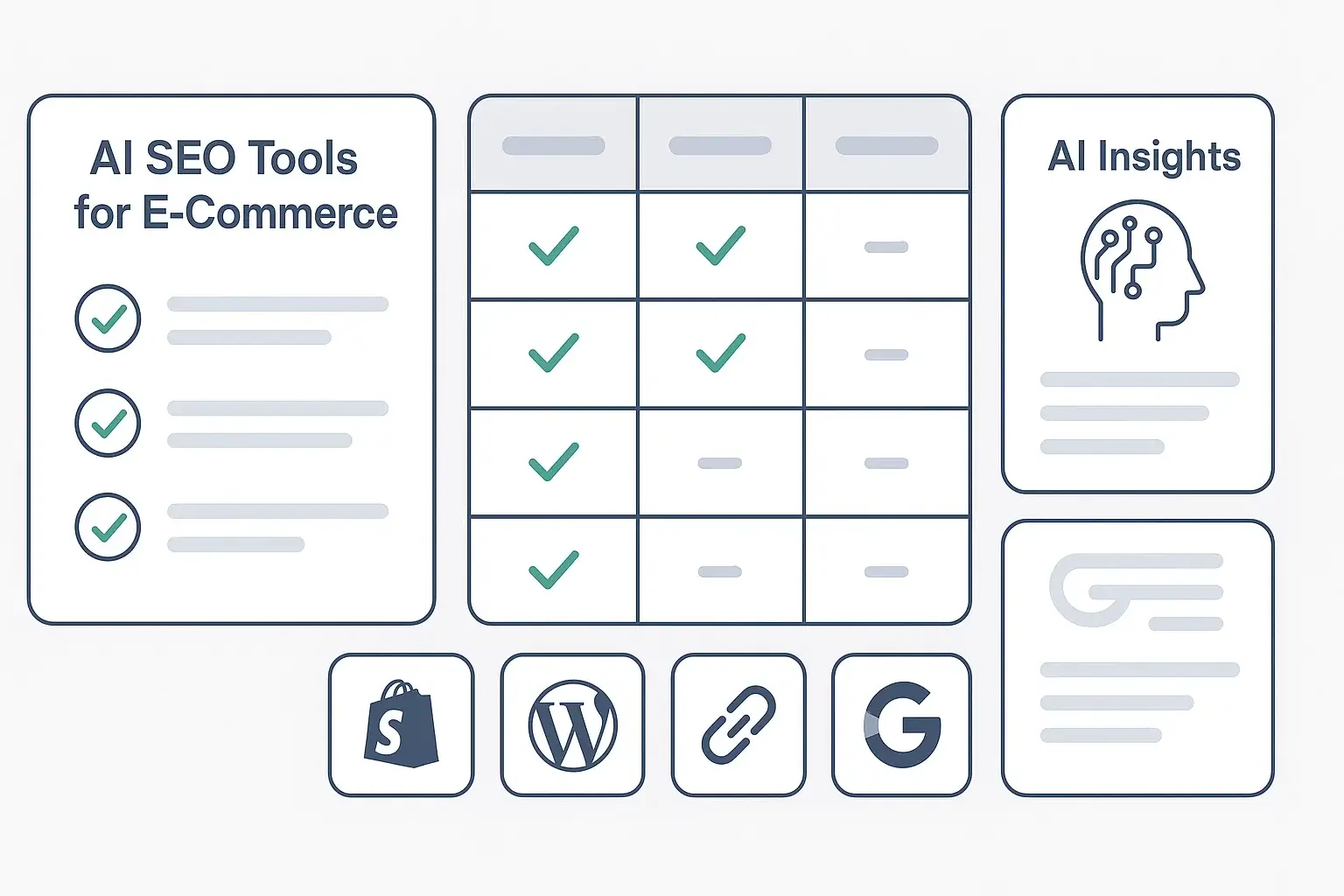
Common Pitfalls and Best Practices When Using AI SEO Tools
While AI SEO tools provide massive advantages, many e-commerce brands fail to achieve meaningful results because they rely on automation without strategy. Understanding these pitfalls—and following the right best practices—ensures your AI-powered SEO efforts stay effective, compliant, and user-centric.
Common Pitfalls to Avoid
1. Over-Automating Without Human Review
AI can accelerate optimization, but it cannot replace strategic judgment. Auto-generated titles or descriptions may sound repetitive, generic, or misaligned with brand tone. Always perform manual checks on high-value product pages.
2. Ignoring Data Quality Issues
AI recommendations rely heavily on the accuracy of your product data. Missing attributes, incorrect variants, or outdated pricing lead to poor SEO output and weak category visibility.
3. Treating All AI Tools as Equal
Many platforms advertise “AI features” but offer shallow automation. Choose tools with real machine learning capabilities, not just templates repackaged as AI.
Best Practices for AI-Driven E-commerce SEO
1. Combine AI Insights With Human Strategy
Let AI handle volume tasks while your team focuses on messaging, brand storytelling, and customer psychology.
2. Maintain Clean, Structured Product Data
Provide accurate product attributes, pricing, images, and variants so AI can generate strong metadata and schema.
3. Track AI Recommendations Over Time
Use dashboards from advanced AI SEO analytics tools to monitor improvements, identify patterns, and fine-tune ongoing strategies.
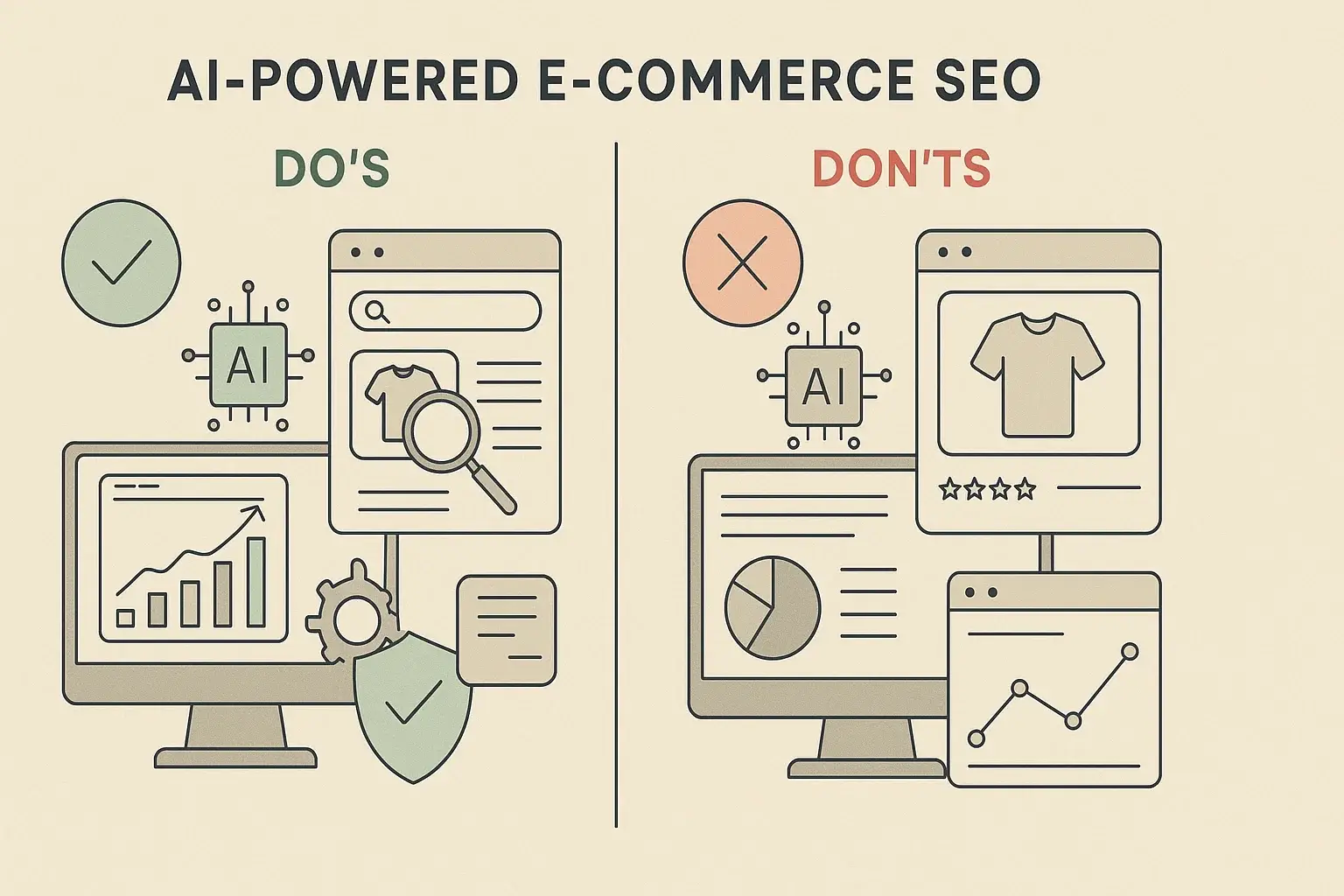
Future Trends: What’s Next for AI and E-commerce SEO Beyond 2026
AI’s impact on e-commerce SEO is only just beginning. As search platforms evolve into multimodal, conversational, and predictive ecosystems, optimization will shift from keywords to intent orchestration, user signals, and entity-level search understanding. Product discovery will increasingly rely on visual search, voice queries, and AI-driven recommendation engines instead of traditional SERPs.
Generative AI agents will soon handle comparison shopping automatically, presenting users with summarized product insights, reviews, and price evaluations. This means e-commerce brands must deliver consistent, structured, high-quality data that AI systems can easily interpret. Visual SEO—optimizing images, videos, and 3D models—will also gain importance as customers browse more visually across mobile and AR platforms. For businesses preparing for this shift, adopting the right AI SEO tools early creates a long-term competitive advantage.
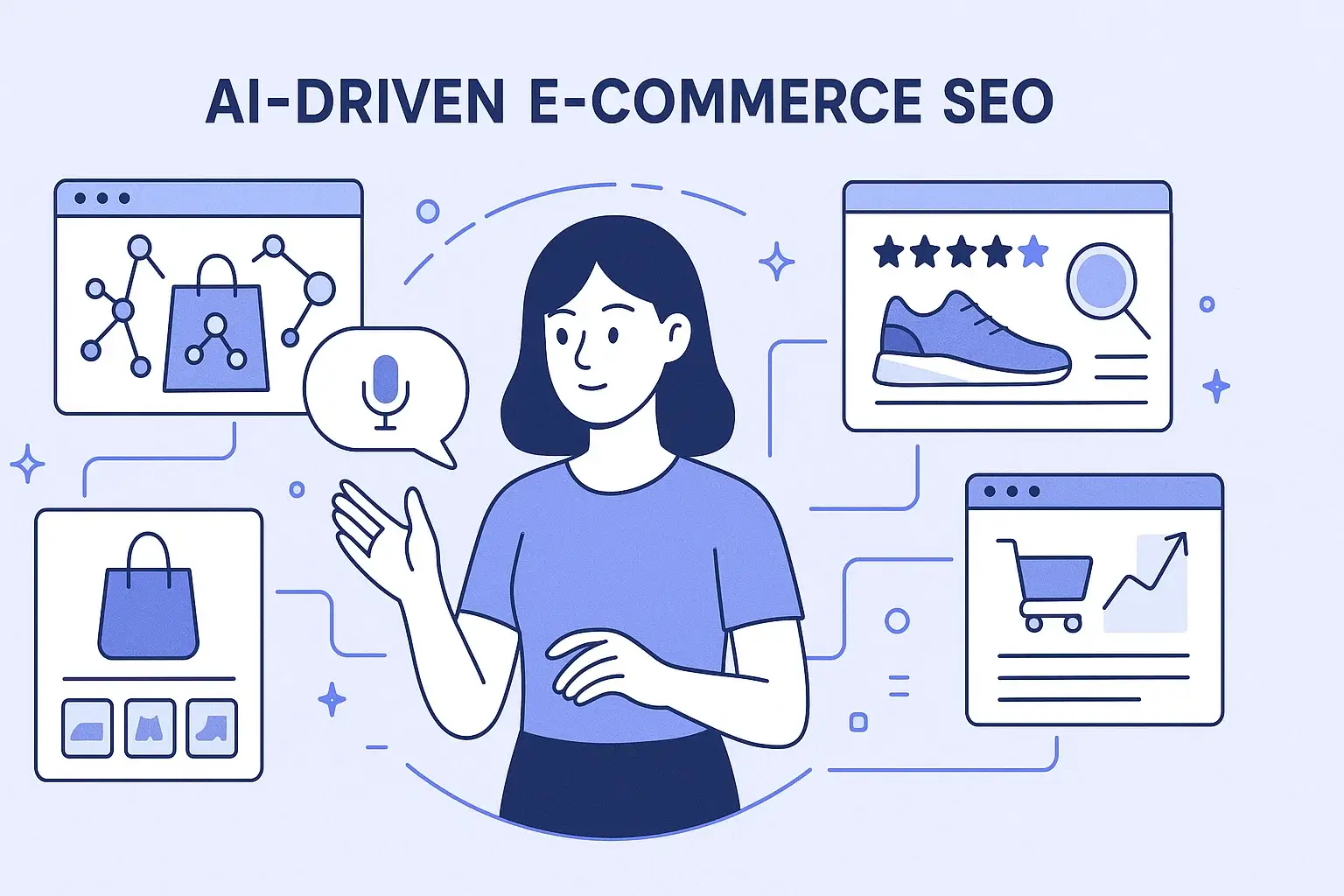
Conclusion
AI SEO tools are no longer optional for e-commerce brands in 2026 – they are the foundation of scalable, profitable, and future-ready digital growth. From hyper-personalized product discovery to predictive ranking insights, AI enables retailers to optimize thousands of pages, understand customer intent deeply, and respond faster to market shifts.
Businesses that invest in AI-driven optimization now will not only outperform competitors today but also stay prepared for the next generation of AI-first search. The earlier you integrate AI SEO automation, the stronger your visibility, conversions, and long-term authority become.
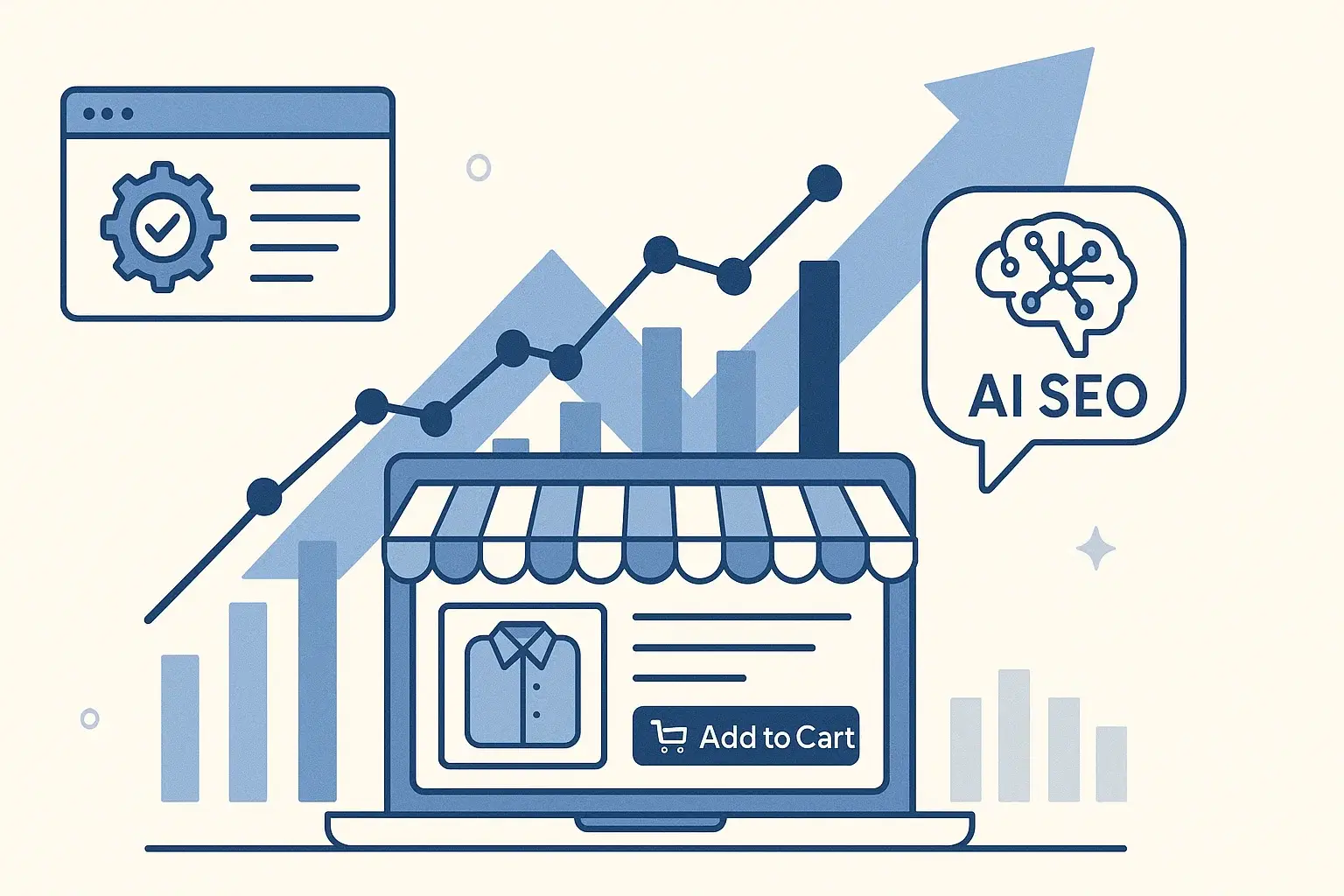
Frequently Asked Questions
What are AI SEO tools and how are they different from traditional SEO tools?
AI SEO tools use machine learning to analyze search patterns, optimize content, automate keyword mapping, predict ranking trends, and enhance product visibility at scale. Unlike traditional tools, they learn from user behavior and adapt their suggestions over time.
Are AI SEO tools suitable for small e-commerce businesses?
Yes. AI tools help smaller stores compete with larger brands by providing automated optimization, better keyword insights, and faster technical fixes—without needing a large SEO team.
How do AI link building tools help e-commerce websites?
AI link building tools identify authoritative sites, analyze relevance, automate outreach personalization, and strengthen internal linking structures. This improves category authority and organic ranking stability.
Can AI help improve product page content and descriptions?
Absolutely. AI content optimization tools rewrite descriptions, enhance metadata, suggest keywords, identify missing attributes, and align content with user intent and search demand.
How can I get started with AI SEO for my e-commerce store?
Begin by auditing your existing pages, selecting scalable AI SEO software, and integrating tools for keyword research, on-page optimization, and predictive analytics. For expert assistance, explore our Digital Marketing Services.





